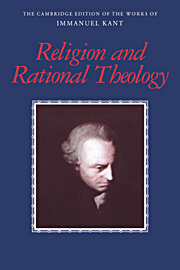Book contents
- Frontmatter
- Contents
- General editors' preface
- General introduction
- What does it mean to orient oneself in thinking? (1786)
- On the miscarriage of all philosophical trials in theodicy (1791)
- Religion within the boundaries of mere reason (1793)
- The end of all things (1794)
- The conflict of the faculties (1798)
- Preface to Reinhold Bernhard Jachmann's Examination of the Kantian Philosophy of Religion (1800)
- Lectures on the philosophical doctrine of religion (1817)
- Editorial notes
- Glossary
- Index of names
- Index of subjects
- Index of biblical references
General introduction
Published online by Cambridge University Press: 05 June 2012
- Frontmatter
- Contents
- General editors' preface
- General introduction
- What does it mean to orient oneself in thinking? (1786)
- On the miscarriage of all philosophical trials in theodicy (1791)
- Religion within the boundaries of mere reason (1793)
- The end of all things (1794)
- The conflict of the faculties (1798)
- Preface to Reinhold Bernhard Jachmann's Examination of the Kantian Philosophy of Religion (1800)
- Lectures on the philosophical doctrine of religion (1817)
- Editorial notes
- Glossary
- Index of names
- Index of subjects
- Index of biblical references
Summary
The subjects of religion and rational theology are integral to many of Kant's writings. Reflections on rational theology and the theological interpretation of nature were central to some of Kant's first important writings: the Universal Natural History and Nova dilucidatio (both 1755) and the Only Possible Ground of Proof for a Demonstration of God's Existence (1763). Rational theology and rational religious faith also figure prominently in all three Critiques: the Ideal of Pure Reason and Canon of Pure Reason in the first, the Dialectic of the second, and the Methodology of Teleological Judgment in the third. Although the writings translated in this volume do not therefore encompass the whole of his writings on religion and rational theology, they do contain the texts in which Kant dealt primarily with religion. They also document the history of one of the most critical and dramatic periods in Kant's professional life – the history of the process by which the philosopher came into collision with the Prussian authorities over the content of his teachings on religion.
Religious background
Kant received a strict religious upbringing from his parents, who were both devout pietists. Pietism was a seventeenth-century Christian revival movement that originated in Germany and was a powerful influence on German culture through the eighteenth century. It resembles in some ways other contemporary religious movements, such as the Quakers and Methodists in England or Chassidism among European Jews.
- Type
- Chapter
- Information
- Religion and Rational Theology , pp. xi - xxivPublisher: Cambridge University PressPrint publication year: 1996
- 13
- Cited by

